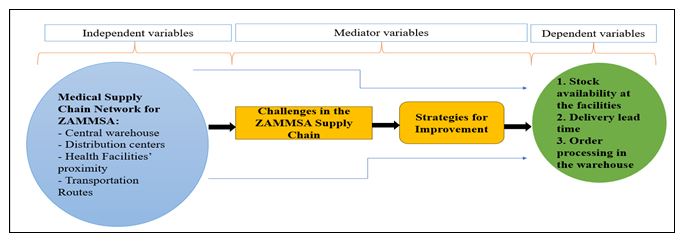Analysis of Challenges of the Medical Supply Chain – A Case of Zambia Medicines and Medical Supplies Agency
DOI:
https://doi.org/10.5281/zenodo.13377978Keywords:
essential medicines, efficiency, primary health care, inventory, supply chainAbstract
Medical supply chains play a vital role in delivering essential health commodities and ensuring the availability of medicines and medical supplies, especially in developing countries. Recent technological, organizational, and economic advancements in healthcare systems have provided increased access to treatment for patients. Therefore, the availability of the right medicine with the right composition for the right patient in the right quantity at the right time is essential for the patient’s safety and recovery. This paper aims to analyse the supply chain operations of the Zambia Medical Stores (ZAMMSA). The study adopted a descriptive study design and employed a mixed research approach. The population comprised of Third-Party Logistics providers, ZAMMSA facilities supported by Third-Party Logistics partners and the health facilities. The study used simple random sampling technique and data was collected with the help of structured questionnaires. Quantitative data was analysed using descriptive statistics and regression analysis while qualitative data was analysed using thematic analysis. The study revealed that, there are persistent operational challenges like procurement delays, incomplete tracking visibility, and inadequate storage capacities. The study also revealed that, strengthened communication channels, collaborative regulatory compliance efforts, contingency planning for disruptions, feedback mechanisms on product issues, transportation route optimization and provider training were the main strategies needed for improving challenges at each supply chain stage.
Downloads
References
Competition and Consumer Protection Commission. (2022). Study on competition in the generic pharmaceutical industry in Zambia. s.l.: s.n.
Imran, M., Kang, C., & Ramzan, M. B. (2018). Medicine supply chain model for an integrated healthcare system with uncertain product complaints. Journal of Manufacturing Systems, 46, 13-28.
Jones, D. (2022). Improving Zambia’s public health supply chain management. s.l.: London Business School.
Kumar, A., Luthra, S., Mangla, S.K., Kazançoğlu, Y., & Mishra, N. (2020). COVID-19 impact on sustainable production and operations management. Sustainable Operations and Computers, 1, 1-7.
Lugada, E. et al. (2022). Health supply chain system in Uganda: current issues, structure, performance, and implications for systems strengthening. Journal of Pharmaceutical Policy and Practice.
McCombes, S. (2023). What is a research design | Types, guide & examples. Available at: https://www.scribbr.com/methodology/research-design/#:~:text=A%20research%20design%20is%20a,or%20criteria%20for%20selecting%20subjects. [Accessed 14 October 2023].
McCullough, J.M., Dalziel, D.J., Aurian-Blajeni, B., & Bishai, D.M. (2019). Strengthening medical product supply chains in Namibia through application of network theory. Globalization and Health, 15(1), 1-14.
Ministry of Health Zambia. (2021). Health sector supply chain strategy and implementation plan 2019 – 2021. s.l.: Ministry of Health Zambia.
Ozcan, P., Mula, J.M., & McFarlane, D.C. (2017). A hierarchical model for warehouse management system optimization. International Journal of Production Research, 55(14), 4087-4106.
Rashid, M. H. A. R. (2023). Research philosophy: positivism, interpretivism, and pragmatism. Available at: https://limbd.org/research-philosophy-positivism-interpretivism-and-pragmatism/. [Accessed 14 October 2023].
Tegan, G. (2021). Mixed methods research | Definition, guide & examples. Available at: https://www.scribbr.com/methodology/mixed-methods-research/. [Accessed 15 October 2023].
Thomas, L. (2020). Cluster sampling | A simple step-by-step guide with examples. s.l.: Scribbr.
Udom Phunlarp, P. P. (2019). Solutions to solve problems and increasing efficiency warehouse a case study of xyz company limited. Bangkok: International Academic Multidiscipline Research Conference.
Vledder, M. et al. (2019). Improving supply chain for essential drugs in low-income countries: Results from a large-scale randomized experiment in Zambia. Health Systems, 5(2), 158-177.
Xing, Y., Ma, Y., Srour, F.J., Chong, A.Y.L., & Zhao, T. (2021). Leveraging blockchain, Internet of Things, and artificial intelligence to enhance performance and sustainability in logistics. Annals of Operations Research, 1-21.
Yadav, G., Luthra, S., Jakhar, S.K., Mangla, S.K., & Rai, D.P. (2019). A framework to overcome sustainable supply chain challenges through solution measures of industry 4.0 and circular economy: An automotive case. Journal of Cleaner Production, 254, 119712.
Yu, X., Li, C., Shi, Y., & Yu, M. (2010). Pharmaceutical supply chain in China: Current issues and implications. Health Policy, 8-15.
Zambia Ministry of Health. (2023). 2022-2026 national health strategic plan. Lusaka: Zambia Ministry of Health.
Zohrabi, M. (2013). Mixed method research: Instruments, validity, reliability and reporting findings. Theory and Practice in Language Studies, III (2), 254-262.

Downloads
Published
How to Cite
Issue
Section
License
Copyright (c) 2024 George Chopo, Bupe Getrude Mutono-Mwanza

This work is licensed under a Creative Commons Attribution 4.0 International License.
Research Articles in 'Management Journal for Advanced Research' are Open Access articles published under the Creative Commons CC BY License Creative Commons Attribution 4.0 International License http://creativecommons.org/licenses/by/4.0/. This license allows you to share – copy and redistribute the material in any medium or format. Adapt – remix, transform, and build upon the material for any purpose, even commercially.









